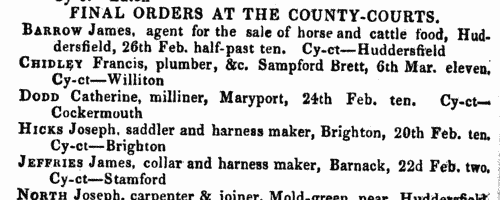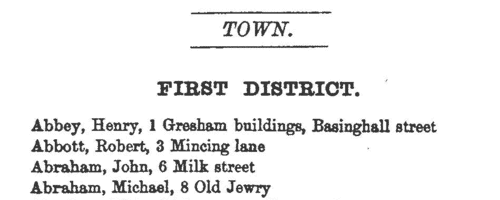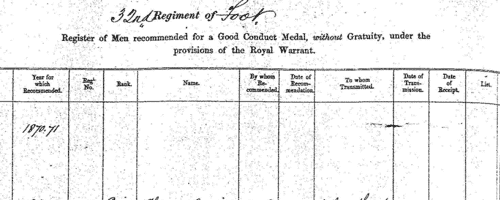Willy Surname Ancestry ResultsOur indexes 1000-1999 include entries for the spelling 'willy'. In the period you have requested, we have the following 119 records (displaying 81 to 90): Single Surname Subscription | | | Buying all 119 results of this search individually would cost £630.00. But you can have free access to all 119 records for a year, to view, to save and print, for £100. Save £530.00. More... |
These sample scans are from the original record. You will get scans of the full pages or articles where the surname you searched for has been found. Your web browser may prevent the sample windows from opening; in this case please change your browser settings to allow pop-up windows from this site. Unclaimed Dividends
(1855)
The unclaimed dividend books of the Bank of England, containing names and descriptions of over 20,000 persons entitled to many millions of pounds accumulated in the bank unclaimed during the 18th and 19th centuries, mostly in consols and annuities, and transferred to the Commissioners for the Reduction of the National Debt.
WILLY. Cost: £6.00.  | Sample scan, click to enlarge

| Traders and professionals in London
(1856)
The Post Office London Directory for 1856 includes this 'Commercial and Professional Directory', recording over 100,000 individuals. WILLY. Cost: £4.00.  | Sample scan, click to enlarge

|  Persons of standing recommending London police recruits
(1843-1857) Persons of standing recommending London police recruits
(1843-1857)
The Metropolitan Police Register of Joiners (MEPO 4/334) lists policemen joining the force 1 January 1843 to 1 April 1857 (warrant numbers 19893 to 35804). The register is alphabetical, in so far as the recruits are listed chronologically grouped under first letter of surname. It gives Date of Appointment, Name, Number of Warrant, Cause of Removal from Force (resigned, dismissed, promoted or died), and Date of Removal. Although the register was closed for new entrants at the end of 1842, the details of removals were always recorded, some being twenty or more years later. Those recruits not formerly in the police, the army, or some government department, were required to provide (normally) at least two letters of recommendation from persons of standing, and details of these are entered on the facing pages. Where a recruit was only recently arrived in the metropolis, the names and addresses of the recommenders can be invaluable for tracing where he came from. Those recruits not formerly in the police, the army, or some government department, were required to provide (normally) at least two letters of recommendation from persons of standing, and details of these are entered on the facing pages: the names in these are indexed here (the police recruits are indexed separately and not included here). Recruits transferred from other forces or rejoining the force did not normally need recommendations - in the latter case, former warrant numbers are given - but some recommendations are from police inspectors, even other constables. Recruits coming from the army sometimes have general military certificates of good conduct, but most often have a letter from their former commanding officer; recruits recommended by government departments (most often the Home Office) similarly have letters from the head of department. But the great majority of the names and addresses in these pages are of respectable citizens having some sort of personal acquaintance with the recruit. Where more than two recommendations were provided, the clerk would only record one or two, with the words 'and others'. Tradesmen are sometimes identified as such by their occupations; there are some gentry. Although the bulk of these names are from London and the home counties, a scattering are from further afield throughout Britain and Ireland. WILLY. Cost: £8.00.  | Sample scan, click to enlarge

| Anglican Clergy in England and Wales
(1858)
The Clergy List for 1858 includes this comprehensive list of Anglican clergymen in England and Wales, whether beneficed or not. The names are arranged alphabetically by surname, and christian name or initials, with degree, and current office.WILLY. Cost: £4.00.  | Sample scan, click to enlarge

| Insolvents in England and Wales
(1858)
Perry's Bankrupt and Insolvent Gazette, issued monthly, included lists of insolvencies and stages in the process whereby the insolvents petitioned for release from debtors' prison. The insolvent is generally referred to by name (surname first), address and trade. This is the index to the names of the insolvents, from the issues from January to December 1858.WILLY. Cost: £6.00.  | Sample scan, click to enlarge

| London Members of the National Provident Institution
(1870)
The membership lists of the National Provident Institution were issued in separate volumes for Town (i. e., London and vicinity) and Country members. This list of Town Members is arranged alphabetically within fifteen districts (1 City; 2 Strand, Bloomsbury; 3 Pentonville, Islington, Highbury, Holloway; 4 Soho, St James's, Marylebone; 5 Camden Town, Kentish Town, Hampstead, Highgate; 6 Regent's Park, St John's Wood, Kilburn; 7 Paddington, Bayswater, Notting Hill, Acton, Ealing; 8 Brompton, Kensington, Hammersmith; 9 Westminster, Pimlico, Chelsea, Fulham; 10 Bishopsgate Without, Shoreditch, Finsbury, City Road, Hoxton; 11 Kingsland, De Beauvoir Town, Mildmay Park, Stoke Newington, Stamford Hill, Tottenham, Edmonton; 12 Whitechapel, Docks, Stepney, Limehouse, Poplar, Plaistow, Barking; 13 Spitalfields, Hackney Road, Bethnal Green, Mile End, Bow, Old Ford, Stratford; 14 Dalston, Hackney, Homerton, Clapton; 15 Southwark). Full name is given, surname first, and full postal address except in those few cases where the member subscribed through an agent. WILLY. Cost: £4.00.  | Sample scan, click to enlarge

|  Outstanding soldiers of the 59th (2nd Nottinghamshire) Regiment of Foot
(1870-1875) Outstanding soldiers of the 59th (2nd Nottinghamshire) Regiment of Foot
(1870-1875)
Each year just a handful of outstanding soldiers of the regiment were chosen for good conduct medals and gratuities: these are listed here. There were two lists, one for men recommended for the Good Conduct Medal without a gratuity, and one for gratuities - £5 to a private, £10 to a corporal, and £15 to a serjeant. Both lists are indexed here, and each gives rank, name, regimental number, date of recommendation and date of issue. (The sample scan is from the 32nd foot). The regiment was in Ceylon throughout this period.WILLY. Cost: £8.00.  | Sample scan, click to enlarge

| Mining Fatalities: North and East Lancashire
(1875)
The fourteen Inspectors of Mines for the United Kingdom of Great Britain and Ireland made separate annual reports, each including a tabular account of fatal mining accidents within his area, giving date; sequential number of accident for the area for the year; the name of the mine; where situate; the owner's or agent's name; the full name of the person killed; his occupation; age; cause of death, and remarks. There are in all fifteen tables, for: Cornwall, Devon, Dorset and part of Somerset; Cumberland, Northumberland and Furness; Ireland; the Midlands; North and East Lancashire; North Staffordshire, Cheshire and most of Shropshire; North Wales (including an adjoining part of Shropshire) and the Isle of Man; Western Scotland; the rest of Scotland; South Durham, Westmorland and the North Riding of Yorkshire; Gloucestershire, Herefordshire, Wiltshire, Monmouthshire and adjoining parts of South Wales; South Staffordshire and Worcestershire (the Black Country); the rest of South Wales; western Lancashire; and Yorkshire (other than the North Riding) and Lincolnshire.WILLY. Cost: £6.00.  | Sample scan, click to enlarge

| Petroleum Licences: St George the Martyr, Southwark
(1875)
Under the provisions of the Petroleum Act of 1871, the London Metropolitan Board of Works was given the power to grant annual licences to the owners of premises which had been inspected and certified as fit for the storage of petroleum. The lists state parish or district; name (surname first); case number; address (including house number); quantity to be kept, in gallons, and the nature of the storage facility. July to December 1875. WILLY. Cost: £6.00.  | Sample scan, click to enlarge

| Elementary Teachers in Stroud Vale and Severn Side
(1880)
The National Union of Elementary Teachers, established in 1870, brought together members of the profession throughout England and Wales, organized in local Teachers' Associations. Lists of members of the associations were printed in the annual reports. Each association's officers are listed first, then the ordinary members. Surnames are given, Mr/Mrs/Miss, initial(s), and the name of the school - B. S., British School; Bd. S., Board School; Congl. S., Congregational School; End. S., Endowed School; Gr. S., Grammar School; N. S., National School; Par. S., Parochial School; Pres. S., Presbyterian School; R. C. S., Roman Catholic School; Undl. S., Undenominational School; W. S., Wesleyan School.WILLY. Cost: £6.00.  | Sample scan, click to enlarge

|
Research your ancestry, family history, genealogy and one-name study by direct access to original records and archives indexed by surname.
|













